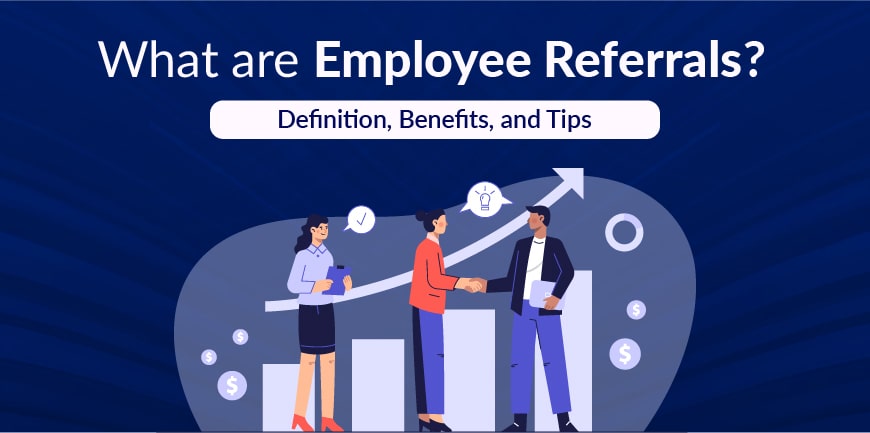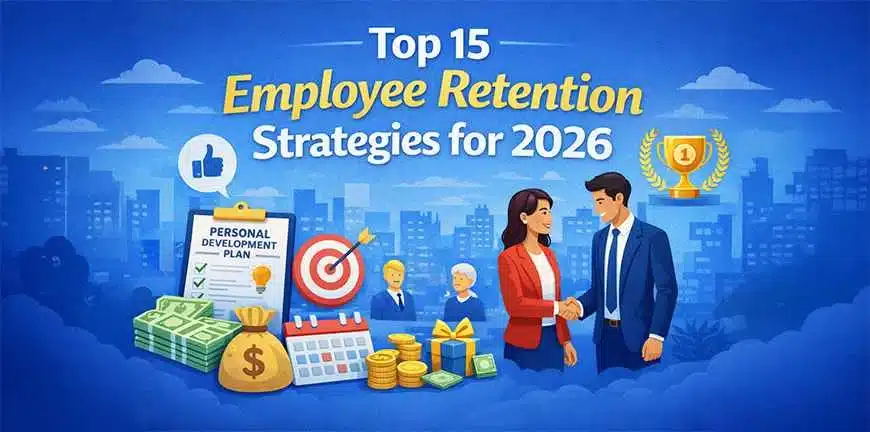
What is the Recruitment Process? Definition, Importance, Stages, Challenges, Methods
15/05/2025
What is Effective Staffing? Definition, Process and Types
15/05/2025Introduction
Recruiting and hiring candidates requires a lot of time, energy, and resources. However, taking advantage of employee referrals not only speeds up the process but also helps improve the quality of candidates being hired. Employee referral meaning is quite straightforward, and it is an incentivised program where potential candidates are referred by existing employees for open positions in an organization. Hiring managers who understand the benefits of employee referrals can fill qualified candidates faster. In this blog, we will be seeing what employee referrals are, how companies benefit from them, and tips for effective employee referrals.
What is Employee Referral?
An employee referral is a recruitment method where an existing employee, through their own network, recommends a potential candidate with relevant skills, experience, and qualifications for an open position in the organisation. The referrals can come from either the existing employees’ personal or professional networks. Most companies even offer incentives to employees for the successful referrals. Referrals can help businesses save on recruitment costs and shorten the time of hire.
How Do Employee Referrals Work?
Some of the steps to follow to ensure a successful employee referral process are as follows:
1. Communicate the need for referrals
To gather successful employee referrals, you must first communicate the need for referrals. Hiring managers and department leaders must provide employees with the description of the jobs and the various job openings when they request for referrals. Upon understanding the requirements of the open position, employees can go ahead and explore their network to source the right candidate.
2. Promote participation
After the communicating the referral needs properly, organizations must also communicate the benefits of employee referrals to encourage current employees to participate. Establishing employee referral programs that offer incentives to employees who provide successful referrals is a good step to take.
3. Provide feedback
When employees do refer candidates, regardless of whether you hire them or not, provide them with the necessary feedback as to why you are not hiring them. The feedback could include an assessment of their skills, qualifications, culture fit or any other. This will ensure the current employees that their contribution is valued and can improve the quality of future referrals.
What are the Benefits of Employee Referrals?
Employee Referrals are one of the most popular recruitment strategies as it comes with various advantages including cost cutting and better-quality hires. Here are some of the key benefits of employee referrals-
1. Quality Candidates
Employees working within an organization will have the ability to understand exactly what is required of the open positions including skills, qualifications and culture fit. This understanding allows them to source the right candidates through their personal and professional network for the role. Having several employee referrals can provide recruiters with a variety of options.
2. Lower recruitment costs
Following through a traditional recruitment process is resource intensive, but hiring through employee referrals can reduce time and costs associated with advertising, external recruitment etc. These savings can be used as incentives to offer employees who bring in good referrals.
3. Swift hiring of candidates
Candidates who come through employee referrals will obviously be much more well suited to the role in terms of skills, qualifications, and experience. And having gathered several referrals saves time that recruiter would otherwise need to evaluate candidates.
4. Enhanced employee morale
Hiring based on referrals from existing employees can create a smooth transition for everyone as well as boost employee morale and satisfaction. When a current employee brings in a candidate, it works because they would have assessed the cultural and social fit of the candidate. Considering the candidate’s values, work style and attitude can reduce conflicts within the team.
5. Fill in specialized roles
When organizations are looking for candidates with specific skills for certain roles, employee referrals can help. Employees who are working within the same department may have a network of individuals specializing in the same field with similar interests and knowledge. hey can use their connections from specific work experiences, educational programs, or industry events to find and refer candidates with the specialized qualifications necessary for a specific role.
They can use their connections from specific work experiences, educational programs, or industry events to find and refer candidates with the specialized qualifications necessary for a specific role.
What are the Tips for Building an Effective Employee Referral Program
Creating quality employee referral programs can be a game changer for an organization, in terms of saving costs on recruitment, acquiring quality candidates and increasing employee retention rates. There are 4 key steps to follow to build an effective employee program- Plan, design, promote and maintain.
1. Plan the program
Consider all the aspects of your program and plan the initiative accordingly. Some of the aspects you must consider are-
- Understand and define your hiring needs meaning the number of positions you are looking to fill, is it to just fill current vacancies or are you on the verge of expanding your company, finding it challenging to acquire suitable candidates for a few positions.
- Set clear goals for your program, for example, you are looking to get 10-15 employee referrals in by the March, reduce turnover rate by 10% by June.
- Figure out the resources you need to set up an effective referral program with the specifics including staff, time, and budgets. Also, you must assign an employee to manage and monitor the program.
2. Design an effective program
To design an effective program, you must decide how employees refer candidates to you, what employees are going to tell potential candidates about the company and the positions you are looking for. Ensure that your program is consistent, transparent, and fair. It would even help to choose an ATS to manage the job postings and applications.
Draft a clear employee referral policy that maps out all the processes and procedures so that your current employees understand how the program works and how they would benefit out of is as well.
3. Promote your program
Your work does not stop at designing a good employee referral program, post that you must also promote it. However, do not load your employees with too much information. Make sure that you have a simple employee referral program template, that is easy for employees to understand. This will encourage them to get on board with you and refer candidates.
Some of the ways you can promote your employee referral programs is by posting a simple template on social media pages and ask your employees to share it with contacts, you can send an email blast or even hold launch parties for employee referral programs.
4. Monitor and maintain your program
Employee referral programs rely on the motivation and enthusiasm of the employees. Do not forget to reward and recognize your employees’ efforts on a regular basis. Regardless of you make the hire or not, make sure you update employees who have referred candidates and let them know of the result and why you chose to either hire or not hire the candidate.
Track the right metrics can help you understand whether your employee referral program is working. Metrics like employee referral rates, participation rates and referral to hire ratios.
What are the Best Practices & Examples of Employee Referral Programs
Here are some of the few best practices to follow to make employee referral programs successful-
1. Offer good incentives
This is the most obvious one. Employees like being rewarded for their efforts, and referring a candidate is an effort they expect you to acknowledge and reward. Incentives act as their motivation to bring the right candidate. Incentives can be either in the form of a bonus, time-off or other benefits like gig tickets, a weekend away and more.
2. Promote a need for culture change
While employee referrals are a great way to hire candidates, it is not just about that. To get to a place where your employees proactively participate in employee referral programs you need to drive a change in mindset.
3. Empower employees
An employee referral is a reliable source for hiring successful candidates because here, the employee that is referring a candidate acts as a mediator and helps both parties understand why this is great fit for both. But how can you empower your employees to bring in better candidates?
- Have a strong, consistent employer brand to ensure the candidates are hearing the right message
- Equip your employees with tools like employee referral templates, critical first interview questions, company info and more
- Tell your employees as to exactly what you are looking for in a candidate.
4. Take a strategic approach
A generic approach may not work for all employee referrals. Some niche role positions may require organizations to take a strategic approach. Prioritise jobs with the highest impact, prioritise candidates with highest impact, meaning those with specialized skills or diverse backgrounds, prioritise referrals from the highest-impact employees, prioritise referrals from employees with a rich network of personal and professional connections.
5. Craft an easy employee referral program
Your employee referral management must be easy. Easy for employees as well as recruiters. Draft an easy employee referral program template to encourage employees to understand and participate in the program as well as explain to their referral as to why it is a good opportunity to take up the job.
Here some of the employee referral program examples:
- PURE- the referral rate at PURE is high and more than 50% of its employees are hired through employee referrals. How does this happen? As soon a new hire has made it through his/her first weeks at the company, they get asked if they know anyone else who could be a good fit for the firm.
- Salesforce’s happy hours- Salesforce is known to reward its employees handsomely, and not just for successful referrals but also for those who volunteer in their community. The company organizes Recruitment Happy Hours, get-togethers where employees can invite the people they want to refer.
- InMobi’s bikes- needed engineering managers and they needed to think something creative to attract the right ones. To keep employees on top of their referral game, both vehicles were parked right at the entrance of the offices. For every successful referral, InMobi’s employees could choose between a brand-new bike and a trip to Bali.
Of course, there is no magic formula for success through employee referrals. A trial-and-error method can help find out what works in your organization. You must test various referral methods until you find the one that suits you best.
Frequently Asked Questions (FAQs)
1. What is the meaning of employee referral?
An employee referral is a recruitment method where an existing employee, through their own network, recommends a potential candidate with relevant skills, experience, and qualifications for an open position in the organisation.
2. What is the difference between employee referral and recruitment?
Employee referrals and recruitment are both methods of hiring, but they differ in how candidates are sourced. Employee referrals leverage existing employee networks, while recruitment involves broader sourcing efforts like job postings and agencies.
3. Why are employee referrals important in hiring?
When compared to other recruitment channels, employee referrals produce higher-quality prospects. Employees are more likely to have a better knowledge of the candidate’s talents, work ethic, and cultural fit inside the firm when they recommend someone they know.
4. Are employee referrals more successful than any other hiring methods?
With employee referrals companies can tap into existing networks of current employees, eliminating the lengthy process associated with traditional recruiting. Moreover, candidates who come through referrals are often pre-vetted by employees, leading to a faster and more successful hiring process.
5. Do all companies offer incentives for employee referrals?
It is not a universal practice, and not all companies offer incentives for employee referrals. However, if a company is serious about acquiring quality candidates through employee referrals, then it is recommended that offer some sort of incentive to the employee that brings in a successful candidate. The decision to offer incentives is a business strategy, and some companies may choose not to offer them due to numerous factors.
Contact Us For Business Enquiry

Rajkumar Shanmugam
Rajkumar Shanmugam is the Head of HR at ALP Consulting, bringing over 19 years of comprehensive HR leadership experience across India and international markets. His expertise spans talent acquisition, employee relations, performance management, compliance, and HR transformation. Rajkumar has a proven track record of driving people-centric initiatives, enhancing workplace culture, and aligning HR strategy with business goals. With extensive experience in US staffing operations and global mobility, he continues to lead organizational excellence through innovation and employee engagement.




